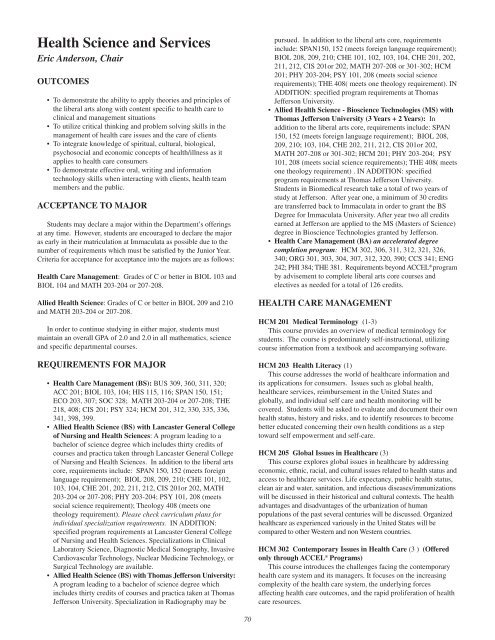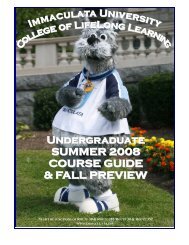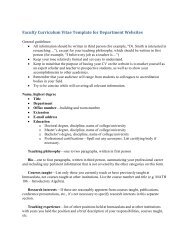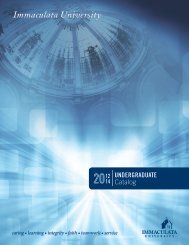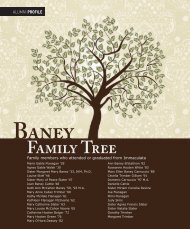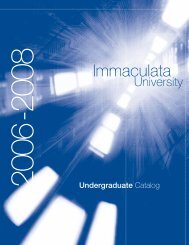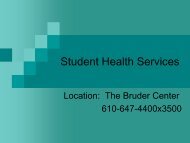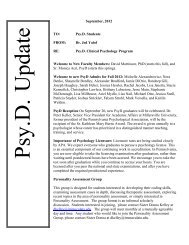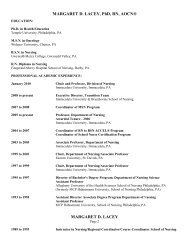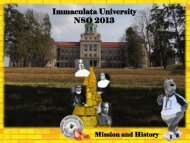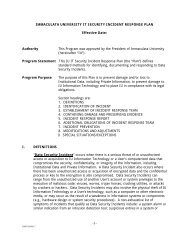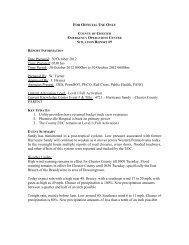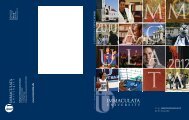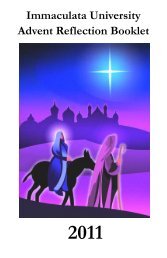Undergraduate Catalog 2008-2010 - Immaculata University
Undergraduate Catalog 2008-2010 - Immaculata University
Undergraduate Catalog 2008-2010 - Immaculata University
Create successful ePaper yourself
Turn your PDF publications into a flip-book with our unique Google optimized e-Paper software.
Health Science and Services<br />
Eric Anderson, Chair<br />
OUTCOMES<br />
• To demonstrate the ability to apply theories and principles of<br />
the liberal arts along with content specific to health care to<br />
clinical and management situations<br />
• To utilize critical thinking and problem solving skills in the<br />
management of health care issues and the care of clients<br />
• To integrate knowledge of spiritual, cultural, biological,<br />
psychosocial and economic concepts of health/illness as it<br />
applies to health care consumers<br />
• To demonstrate effective oral, writing and information<br />
technology skills when interacting with clients, health team<br />
members and the public.<br />
ACCEPTANCE TO MAJOR<br />
Students may declare a major within the Department’s offerings<br />
at any time. However, students are encouraged to declare the major<br />
as early in their matriculation at <strong>Immaculata</strong> as possible due to the<br />
number of requirements which must be satisfied by the Junior Year.<br />
Criteria for acceptance for acceptance into the majors are as follows:<br />
Health Care Management: Grades of C or better in BIOL 103 and<br />
BIOL 104 and MATH 203-204 or 207-208.<br />
Allied Health Science: Grades of C or better in BIOL 209 and 210<br />
and MATH 203-204 or 207-208.<br />
In order to continue studying in either major, students must<br />
maintain an overall GPA of 2.0 and 2.0 in all mathematics, science<br />
and specific departmental courses.<br />
REQUIREMENTS FOR MAJOR<br />
• Health Care Management (BS): BUS 309, 360, 311, 320;<br />
ACC 201; BIOL 103, 104; HIS 115, 116; SPAN 150, 151;<br />
ECO 203, 307; SOC 328; MATH 203-204 or 207-208; THE<br />
218, 408; CIS 201; PSY 324; HCM 201, 312, 330, 335, 336,<br />
341, 398, 399.<br />
• Allied Health Science (BS) with Lancaster General College<br />
of Nursing and Health Sciences: A program leading to a<br />
bachelor of science degree which includes thirty credits of<br />
courses and practica taken through Lancaster General College<br />
of Nursing and Health Sciences. In addition to the liberal arts<br />
core, requirements include: SPAN 150, 152 (meets foreign<br />
language requirement); BIOL 208, 209, 210; CHE 101, 102,<br />
103, 104, CHE 201, 202, 211, 212, CIS 201or 202, MATH<br />
203-204 or 207-208; PHY 203-204; PSY 101, 208 (meets<br />
social science requirement); Theology 408 (meets one<br />
theology requirement). Please check curriculum plans for<br />
individual specialization requirements. IN ADDITION:<br />
specified program requirements at Lancaster General College<br />
of Nursing and Health Sciences. Specializations in Clinical<br />
Laboratory Science, Diagnostic Medical Sonography, Invasive<br />
Cardiovascular Technology, Nuclear Medicine Technology, or<br />
Surgical Technology are available.<br />
• Allied Health Science (BS) with Thomas Jefferson <strong>University</strong>:<br />
A program leading to a bachelor of science degree which<br />
includes thirty credits of courses and practica taken at Thomas<br />
Jefferson <strong>University</strong>. Specialization in Radiography may be<br />
pursued. In addition to the liberal arts core, requirements<br />
include: SPAN150, 152 (meets foreign language requirement);<br />
BIOL 208, 209, 210; CHE 101, 102, 103, 104, CHE 201, 202,<br />
211, 212, CIS 201or 202, MATH 207-208 or 301-302; HCM<br />
201; PHY 203-204; PSY 101, 208 (meets social science<br />
requirements); THE 408( meets one theology requirement). IN<br />
ADDITION: specified program requirements at Thomas<br />
Jefferson <strong>University</strong>.<br />
• Allied Health Science - Bioscience Technologies (MS) with<br />
Thomas Jefferson <strong>University</strong> (3 Years + 2 Years): In<br />
addition to the liberal arts core, requirements include: SPAN<br />
150, 152 (meets foreign language requirement); BIOL 208,<br />
209, 210; 103, 104, CHE 202, 211, 212, CIS 201or 202,<br />
MATH 207-208 or 301-302; HCM 201; PHY 203-204; PSY<br />
101, 208 (meets social science requirements); THE 408( meets<br />
one theology requirement) . IN ADDITION: specified<br />
program requirements at Thomas Jefferson <strong>University</strong>.<br />
Students in Biomedical research take a total of two years of<br />
study at Jefferson. After year one, a minimum of 30 credits<br />
are transferred back to <strong>Immaculata</strong> in order to grant the BS<br />
Degree for <strong>Immaculata</strong> <strong>University</strong>. After year two all credits<br />
earned at Jefferson are applied to the MS (Masters of Science)<br />
degree in Bioscience Technologies granted by Jefferson.<br />
• Health Care Management (BA) an accelerated degree<br />
completion program: HCM 302, 306, 311, 312, 321, 326,<br />
340; ORG 301, 303, 304, 307, 312, 320, 390; CCS 341; ENG<br />
242; PHI 384; THE 381. Requirements beyond ACCEL ® program<br />
by advisement to complete liberal arts core courses and<br />
electives as needed for a total of 126 credits.<br />
HEALTH CARE MANAGEMENT<br />
HCM 201 Medical Terminology (1-3)<br />
This course provides an overview of medical terminology for<br />
students. The course is predominately self-instructional, utilizing<br />
course information from a textbook and accompanying software.<br />
HCM 203 Health Literacy (1)<br />
This course addresses the world of healthcare information and<br />
its applications for consumers. Issues such as global health,<br />
healthcare services, reimbursement in the United States and<br />
globally, and individual self care and health monitoring will be<br />
covered. Students will be asked to evaluate and document their own<br />
health status, history and risks, and to identify resources to become<br />
better educated concerning their own health conditions as a step<br />
toward self empowerment and self-care.<br />
HCM 205 Global Issues in Healthcare (3)<br />
This course explores global issues in healthcare by addressing<br />
economic, ethnic, racial, and cultural issues related to health status and<br />
access to healthcare services. Life expectancy, public health status,<br />
clean air and water, sanitation, and infectious diseases/immunizations<br />
will be discussed in their historical and cultural contexts. The health<br />
advantages and disadvantages of the urbanization of human<br />
populations of the past several centuries will be discussed. Organized<br />
healthcare as experienced variously in the United States will be<br />
compared to other Western and non Western countries.<br />
HCM 302 Contemporary Issues in Health Care (3 ) (Offered<br />
only through ACCEL ® Programs)<br />
This course introduces the challenges facing the contemporary<br />
health care system and its managers. It focuses on the increasing<br />
complexity of the health care system, the underlying forces<br />
affecting health care outcomes, and the rapid proliferation of health<br />
care resources.<br />
70


